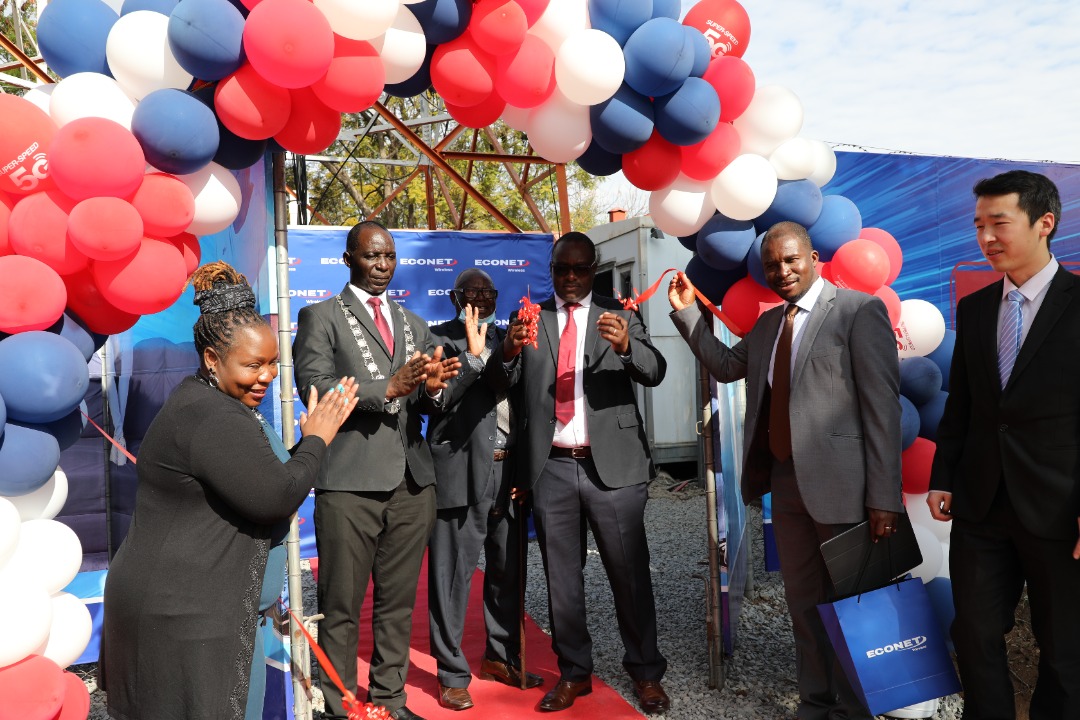|
Getting your Trinity Audio player ready...
|
Econet Wireless on Friday officially launched its 5G network in Victoria Falls as the listed telecommunications company expands its rollout of the super-fast data network to other cities and towns across Zimbabwe.
“We are making good on our commitment to take this super-fast technology to other parts of the country as we deploy the infrastructure that will accelerate the country’s attainment of a fully digital economy,” said Mr. Edwin Banda, Econet Wireless Zimbabwe’s Chief Technology Officer.
He was speaking at the launch event held at Illala Lodge, attended by the Victoria Falls Mayor Councilor Somvelo Dhlamini, players in the tourism sector, Econet executives and channel partners, as well as business leaders – including Mr. Blake Mhatiwa, the acting managing director at Hwange Colliery Company Limited (HCCL), who was the guest of honour. The launch event was also attended by representatives of ZTE, the global telecoms infrastructure, and technology suppliers, who are partners with Econet in rolling out 5G in parts of the country.
Econet first launched 5G in Harare back in February of this year (in partnership with Ericsson) before deploying the technology in Bulawayo in April. The company committed then to rolling out the technology to other cities and towns across the country.
Mr. Banda said the deployment of 5G would support Zimbabwe’s National Development Strategic road map that, among other things, envisages an inclusive digital economy.
“We believe the deployment of 5G here and across the country will offer infinite possibilities for individual, business, and industrial users, and will be a catalyst for economic growth and development in Zimbabwe,” Mr. Banda said.
He added that the company had made significant multimillion-dollar investments in modernizing its network with the aim of building a digital network that leaves no Zimbabwean behind.
Meanwhile, Mr. Mhatiwa said 5G will over time help solve Hwange Colliery Company and the entire mining industry’s ongoing challenges “by helping to raise safety, reduce environmental impact and in raising overall productivity” through technology. He added that it would also help address the revenue expectations of the entire sector.
“His Excellency, President Emmerson Mnangagwa recently challenged us in the mining sector to generate at least US$12 billion by 2023. I believe new technologies such as 5G, which can deliver the high-speed connectivity to support a wide range of new applications, including machine automation, will help us to reach this important milestone,” he said, urging Econet to speed up the 5G network rollout in the mining towns and settlements in Zimbabwe.
The launch of 5G comes at a time the mining industry faces some complex challenges ranging from uncertainty across the geopolitical landscape to the disruption of vital global supply chains.
“The 5G technology allows us to instantly transmit data in ways we previously could only dream of, and vastly increases the possibilities for the deployment of autonomous and remote-controlled machines,” he said.
In Vic Falls, Econet has installed 5G base stations at the National Railways of Zimbabwe office site, and in the central business district. The 5G sites are part of the over 20 base stations the company deployed in Harare, Bulawayo, Chitungwiza, and Gweru.
Mrs. Ivy Sithole, Econet’s Chief Sales Officer, said 5G, which is up to 20 times faster than 4G, will unlock the full capabilities of next-generation broadband services, such as virtual and augmented reality, ultra-high-definition video streaming, artificial intelligence, robotics, automated cars, and IoT (the Internet of Things).
“The 5G technology will also transform businesses and livelihoods beyond just high-speed connectivity. It will enable many industries, such as manufacturing, agriculture, and mining to vastly scale productivity and be more efficient,” she said.
5G – which has been described as “the nervous system of the digital economy” – will usher in new possibilities in several areas of the economy, including smart transport and logistics, e-Health, smart agriculture, smart retail and smart energy networks.






